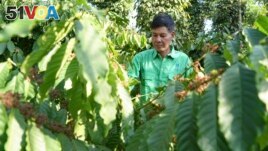27 March 2024
Coffee growers in many countries are worried about a new European rule designed to prevent deforestation.
Deforestation describes when developers cut down trees to make room for crops, buildings or land where cattle can graze.
The new rule goes into effect at the end of 2024. It covers products like coffee, cocoa, soy, palm oil, wood, rubber and beef. The European Union says all of those products result in tree cutting. The United Nations says deforestation is the world's second-leading cause of carbon emissions after the burning of fossil fuels.

Farmer Le Van Tam tends coffee plants at a coffee farm in Dak Lak province, Vietnam on Feb. 1, 2024. (AP Photo/Hau Dinh)
Large producers must show their products come from land where trees have not been cut down since 2020. Smaller producers must do the same but will be permitted to sell their products until July 2025.
A report from the World Wildlife Fund showed that Europe's imports of products linked to forest-clearing caused the second-most deforestation in the world in 2017. That year, China was first. An expert said the new European rule could help prevent more deforestation and push farmers around the world to plant trees, vines and grasses.
Helen Bellfield is a policy director at Global Canopy, a nonprofit organization based in Britain. It suggests business change their production methods that hurt the environment.
She said the new EU rules could force governments to help farmers make changes. On the other hand, farmers could just sell to countries outside of the EU.
The world's top coffee producers include Vietnam, Ethiopia and Peru. Growers in those countries worry they will no longer be able to sell in Europe.
The new EU rules could help coffee farmers like Le Van Tam of Vietnam who has taken the environment into account. He first planted coffee in the Central Highlands area in 1995. At the time, he cleared land so he could grow as much coffee as possible. But in 2019, he changed his growing methods. Instead of using lots of fertilizers and pesticides, he started planting tamarind trees that add nutrients to the soil. He added black pepper vines and grass, which helps to keep the soil moist and prevents erosion. The changes qualified his coffee as "organic," which opened new markets and made his coffee more valuable. He did not produce more, but his profits went up, he said.
Vietnam hopes that more farmers will make changes, which will permit them to sell in Europe and maintain the nation's rank as the world's second-largest coffee producer.
The news is not as good for those in Ethiopia and Peru. Orders for Ethiopian coffee are already falling and Peru's farmers who are in the Amazon River area may not be able to provide information required by the EU.
"There will be winners and losers," Bellfield said.
Vietnam depends on Europe for 40 percent of its coffee sales. As soon as the new rules came out, the country began working to maintain its market share.
Vietnamese officials worked with small farmers to make sure their land met the new EU requirements. In addition, it made a database showing where its coffee came from. Farmers like Tam got special certificates from international agencies that proved how his beans were grown.
Tam said the extra work will be worth it because, even if his costs are higher, he can get more money for his coffee. "Otherwise, we will always be laborers," he said.
Small Vietnamese farmers still must get ready for the new rules. They will need technology to prove where their beans came from and that their land is certified by the EU. They will also need to be sure the qualified beans are not mixed with banned beans. From the harvest to shipment, new systems must be put into place to prevent errors.
Brazil is another big coffee-producing nation. Since it already sells a lot to Europe, experts say most of its products already meet EU requirements.
But farmers in Peru and Ethiopia may need more time. Gizat Worku is head of the Ethiopian Coffee Exporters Association. He said collecting data about the land of millions of small farmers will be a problem. "That requires a huge amount of resources," he said.
Gizat said orders from Europe are already falling. Some coffee exporters are thinking about selling to the Middle East and China instead. Ethiopian coffee sells well in those places.
"These regulations are going to have a tremendous impact," Gizat said.
I'm Anna Matteo. And I'm Dan Friedell.
Dan Friedell adapted this story for Learning English based on a report by the Associated Press.
____________________________________________________
Words in This Story
graze –v. to eat grass
emission –n. the release of a gas from, usually, an industrial process
fossil fuel –n. oil, coal or natural gas
pesticide –n. a chemical that is used to destroy insects that damage crops
moist –adj. the condition of being a little wet, holding some moisture
erosion –n. the process in which land and minerals are broken down by wind, water and temperature
certificate –n. a document or declaration that says the holder is qualified to do something or act in some way
tremendous –adj. really big